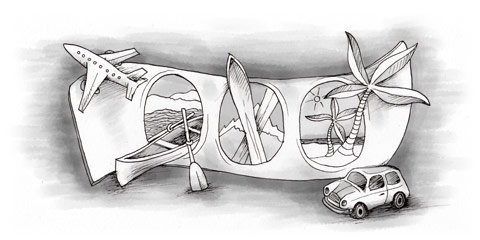In fact many areas outside major cities and holiday destinations aren’t served by public transport at all! Nevertheless, despite its manifest inadequacies, public transport in the form of a subway or urban rail system is faster than travelling by car in most major cities.
The one area of public transport where the US excels is in air travel, where Americans enjoy the most comprehensive and cheapest services in the world. For most Americans, air travel and taxis are the only means of public transport worth considering. Airlines account for some 10 per cent of total passenger miles, compared with 0.5 per cent for inter-city buses and just 0.2 per cent for rail travel. The success of the airline industry has been at the expense of the railways, where an infrequent and relatively expensive national passenger service survives thanks only to federal subsidies.
The Greyhound experience
The US has a comprehensive long-distance bus service (Greyhound), although it’s slow and provides little competition to airlines. It isn’t always essential to own a car in the US, particularly if you live in a city with adequate public transport (and where parking is expensive or impossible). However, if you live in the suburbs or a rural area or do a lot of out of town travelling, a car is essential. When travelling long-distance, the choice is usually between flying and driving.
As people move out of the cities into the surrounding suburbs and countryside, more are commuting to work, creating (one would think) a huge demand for fast and frequent public transport; however, even where trains and busses are available, most commuters steadfastly prefer to rely on their own cars. The US has no long-term unified national transport policy, balancing the needs of the public transport user against those of the motorist. The present system is heavily weighted in favour of private cars and the level of public transport subsidies are among the lowest in the world. The lack of comprehensive public transport services contributes hugely to the incessant traffic jams, particularly in major cities such as Los Angeles and New York, where a short road journey during rush hours can take hours.
Reduced fares for senior citizens and the disabled are provided in most areas, and many transport authorities and companies publish information leaflets for disabled travellers. There are also reduced public transport fares for children, youths and students in most regions. Many cities and towns offer park and ride services, where inexpensive or free parking is combined with low cost public transport into town centres. Most public transport operates reduced services on weekends and on federal holidays.
Beware of Thanksgiving
The single busiest travel period for all forms of public transport is the Thanksgiving holiday period. If you plan to travel any time during the week of the Thanksgiving holiday you should book your train, bus or airline tickets well in advance or you may not be able to travel at all. When booking a holiday you should be wary of travel and holiday deals which seem too good to be true, as they most likely are! Don’t give your credit card details or send any money in response to an advertisement until you know more about the company and have received written details of an offer. Better still, book through a travel agent who’s a member of the American Society of Travel Agents (ASTA), who can usually organise and book all your travel arrangements and save you time and money.
This article is an extract from Living and Working in America. Click here to get a copy now.

